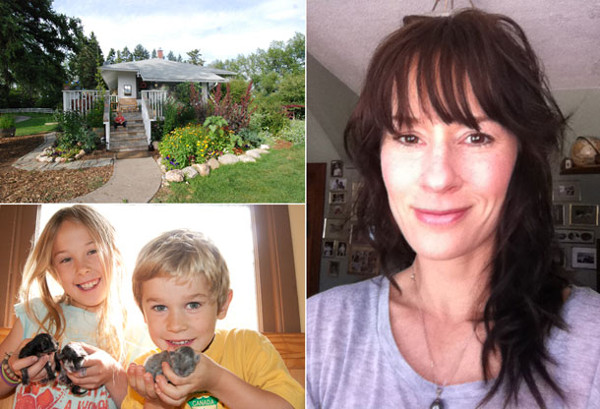This post is for Diana Daunheimer and her family
Diana is featured in investigative journalist Andrew Nikiforuk’s new book Slick Water, shortlisted for the 2016 Alberta Literary Awards and Writers’ Trust of Canada Shaughnessy Cohen Prize.
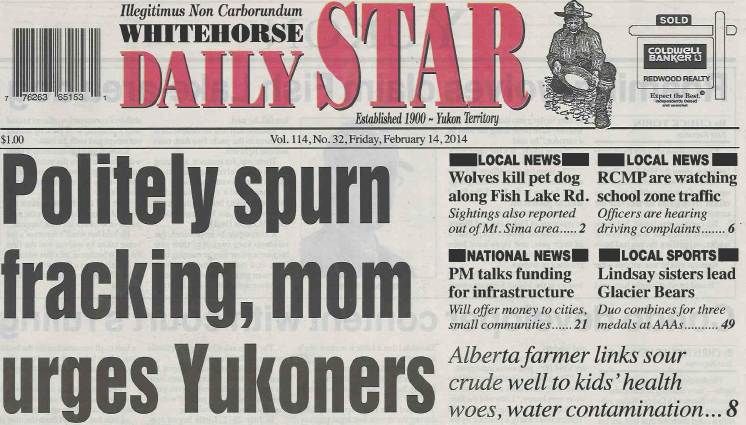
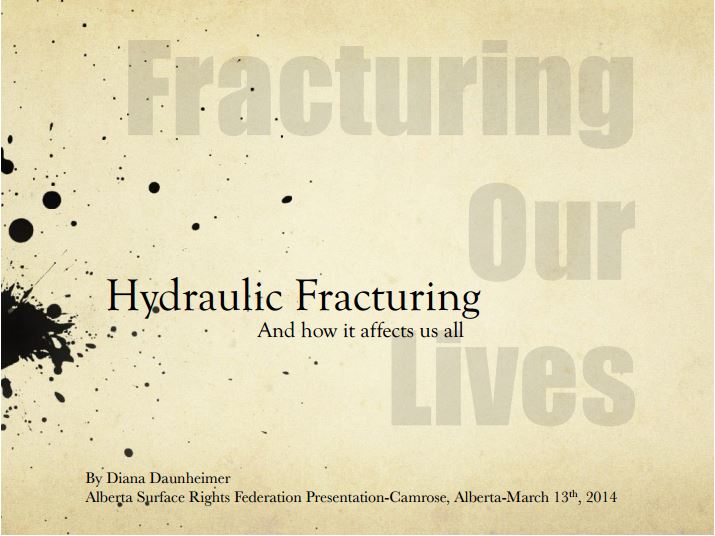
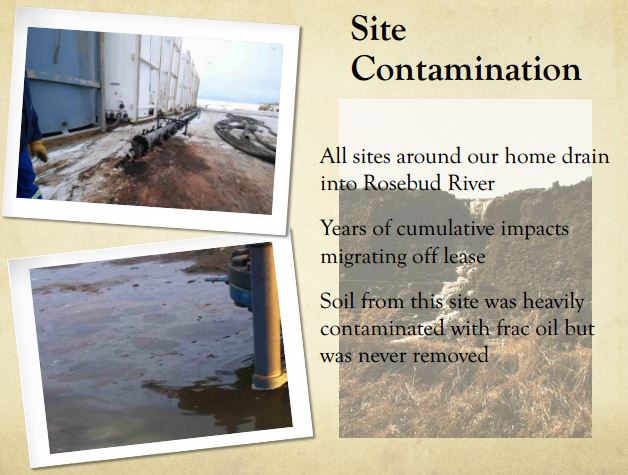
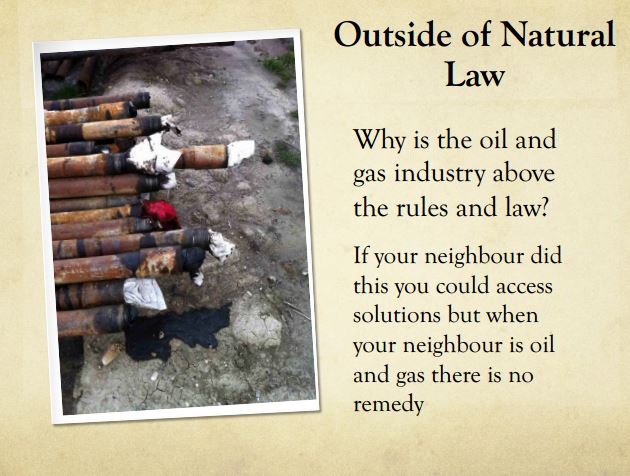
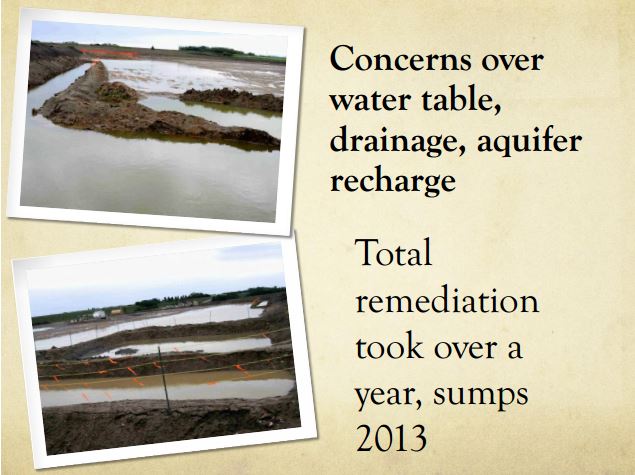
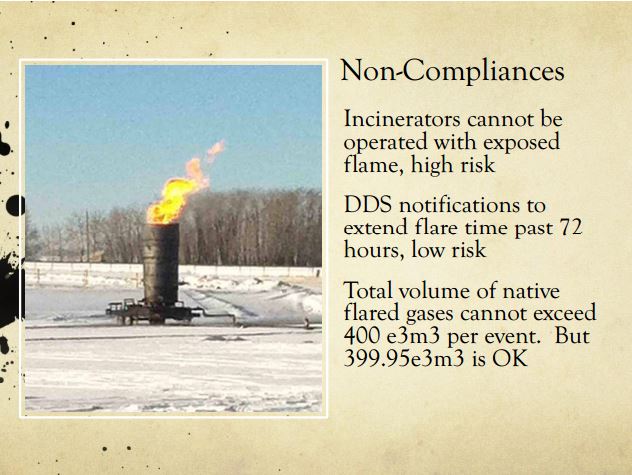
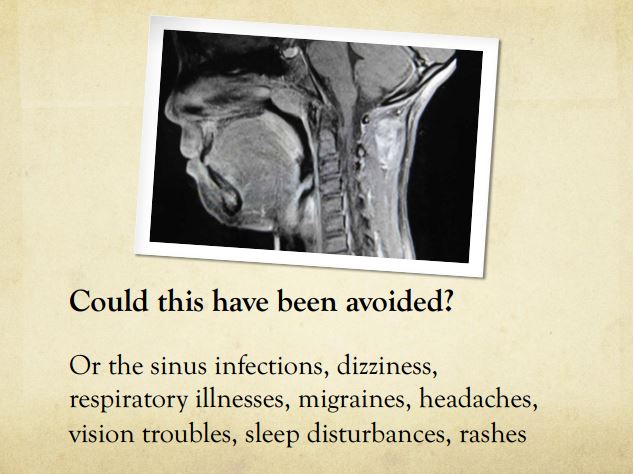
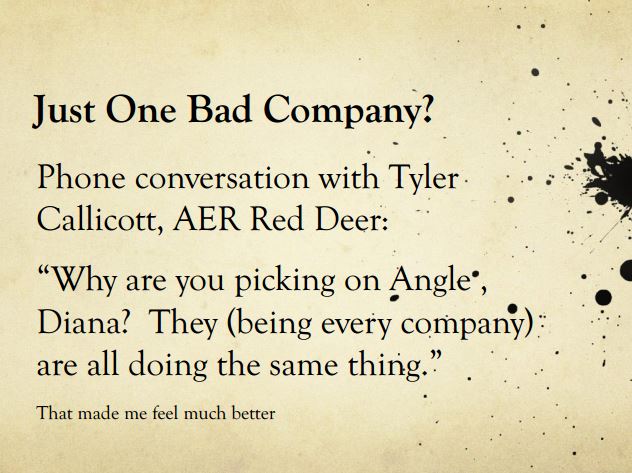
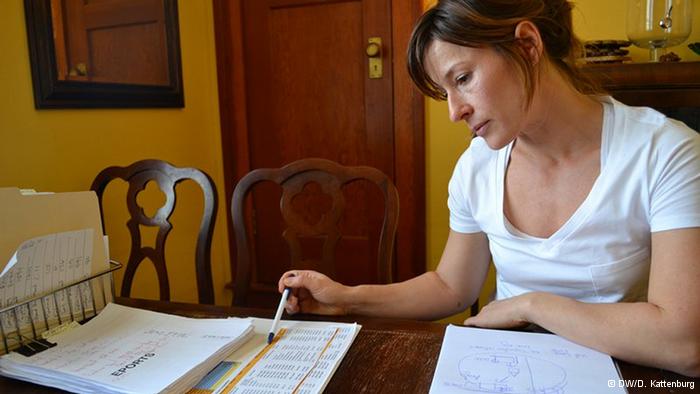
Diana Daunheimer. Photo by David Kattenburg
The Daunheimer farm, west of Didsbury in south-central Alberta (top left). Daunheimer’s kids (bottom left) and mother Diana (right). Photo: Diana Daunheimer.
Mission of Concerned Health Professionals of Ireland (CHPI)
Concerned Health Professionals of Ireland (Republic of Ireland and Northern Ireland) exists to highlight the public health risks and harms that High Volume Hydraulic Fracturing (HVHF) and the exploration & extraction of Oil & Gas from shale rock pose to the people of Ireland.
As health professionals, we have dedicated our working lives to serve and care for the people of Ireland. We feel it is critical that the public health and safety of our communities is taken into consideration in relation to any energy policy for the island and particularly with regard to proven risk-carrying activities such as fracking.
The Nobel Peace Prize-winning international organisation of doctors, Physicians for Social Responsibility, defines fracking:
Hydraulic fracturing, or “fracking”, is a natural gas extraction process that is proving to have negative consequences for human health and for climate change. Fracking for natural gas extraction creates potentially harmful health effects along its entire life cycle: the hydraulic fracturing technique itself, as well as associated processes including road building, pad clearing, truck trips, drilling, cementing, flowback waters, offgassing, fugitive emissions, compressors, and pipelines.
As many reports and studies detail, some of the greatest risks are:
Air pollution
Water contamination
Inherent engineering problems that worsen with time
Radioactive releases
Occupational health and safety hazards
Public Health effects
Noise pollution, light pollution and stress
Earthquakes and seismic activity
Abandoned and active oil and natural gas wells (as pathways for gas and fluid migration)
Flood risks
Threats to agriculture and soil quality
Threats to Climate system
Threats from fracking infrastructure
Inaccurate jobs claims, increased crime rates, threats to property value and mortgages and local government burden
Inflated estimates of oils and gas reserves and profitability
Read more information in the Documentation section of our website for reports, environmental and health reviews, and studies about the risks, problems, and harms of fracking.
Concerned Health Professionals of Ireland Petition (NI)
Dear First Minister and Deputy First Minister,
We, the undersigned physicians, nurses, researchers and health professionals, write to you due to our growing concerns about the public health risks and harm that High Volume Hydraulic Fracturing (HVHF) and the exploration and extraction of Oil & Gas from shale rock pose to the people of Northern Ireland and the Republic of Ireland. We have been reviewing the alarming trends in the scientific peer-reviewed studies regarding the health, environmental and community impacts of exploring, drilling and fracking (hydraulic fracturing) for natural gas from the United States and internationally. The scientific evidence overwhelmingly shows that permitting fracking in Northern Ireland and the Republic of Ireland would pose significant threats to the air, water and the health and safety of individuals and communities here. At the same time, the evidence also shows that fundamental data gaps remain and that the best imaginable regulatory frameworks fall far short of protecting our health and our environment.
The science, which now encompasses more than 550 peer–reviewed studies, has been compiled by the Nobel prize-winning health organization, Physicians for Social Responsibility and the group, Concerned Health Professionals of New York (CHPNY) in a document called The Compendium of Scientific, Medical and Media Findings Demonstrating Risks and Harms of Fracking (Unconventional Gas and Oil Extraction) (http://www.psr.org/assets/pdfs/fracking-compendium.pdf). Note that this technology, involving the extraction of oil and gas from shale rock, goes by many names: fracking, HVHF, and unconventional gas exploration and extraction (UGEE). Modern fracking is different and much more extreme than low-volume, more traditional forms of fracking that have been used in some cases since the 1950s.
Concerned both by the rapidly expanding evidence of harm and by the uncertainties that remain, we urge you to conclude that nothing short of a complete ban on HVHF and the exploration & extraction of Oil & Gas from shale rock in Northern Ireland and the Republic of Ireland is the appropriate course of action.
The pace at which studies on the adverse impacts on health of fracking are emerging has increased substantially in the last two years. The October 2015 issue of the Physicians for Social Responsibility science Compendium tells us that “The study citation database maintained by PSE Healthy Energy shows that over half of the available studies on the adverse impacts of shale and tight gas development have been published since January 2014. In 2014, 192 peer-reviewed studies on these impacts were published. In the first six months of 2015, 103 studies appeared*. The vast majority of these studies reveal problems.” *(PSE Healthy Energy. http://www.psehealthyenergy.org/site/view/1180)
Altogether, the data reveal many serious health risks associated with drilling and fracking operations, and expose intractable, irreversible problems. They also make clear that the relevant risks for harm have neither been fully identified nor adequately assessed. While the scope of concerns and new information is far greater than this letter can accommodate, trends emerging in the three editions of the CHPNY Compendia (July 2014, December 2014 & October 2015) “confirm that the public health risks from unconventional gas and oil extraction are real, the range of adverse impacts significant, and the negative economic consequences considerable.”
After two years conducting the first public health review that has been undertaken on the impacts of UGEE, the New York State Department of Health, in collaboration with the New York State Department of Environmental Conservation, similarly concluded that UGEE poses significant public health risks. The substantial report pointed to many peer-reviewed studies, data from parts of the United States where UGEE is taking place, and a range of serious risks to people’s health and the environment. In December, 2014, New York State announced a ban on HVHF given the risks.
Medical professionals are duty bound to ‘first do no harm.’
This standard of duty should also be the proper course of action for policy makers in Northern Ireland and the Republic of Ireland. Amidst all the uncertainty, this much is very clear: based on the knowledge available to us now with regard to UGEE, the Northern Ireland Executive, including the Department of Health, the Department of Environment and Department of Enterprise, Trade & Industry can come to no other determination, except to say that this admirable and appropriate standard cannot be met. Full and meaningful Public Health involvement from the Department of Health is required to ensure we get comprehensive and rigorous assessment of any issues and research that could impact our patients’ current and future state of health.
We note that public health is best served by transparency and inclusiveness, particularly of those who stand to be affected. In the case of UGEE in Northern Ireland, a Strategic Environmental Assessment [SEA] should have been carried out prior to awarding any of the exploratory licenses. Because a SEA was not carried out, the cumulative impact of the proposed 3000 wells in Northern Ireland has not been assessed.
Given the significant evidence of risks and harms that UGEE pose, we urge that the Northern Ireland Executive, in collaboration with the Department of Health introduce a formal ban on UGEE in Northern Ireland. Given the lack of any evidence indicating that fracking can be done safely – and a wealth of evidence to the contrary – we consider a complete and outright ban the only responsible decision. Thank you. [Emphasis added]
Yours sincerely,
49 Health Professionals Signed (as of May 17, 2016)
Medical professionals to call for permanent ban on fracking, ‘Strong evidence’ that controversial gas extraction process causes medical problems by Ronan McGreevy, May 16, 2016, Irish Times
A group of medical professionals led by a former president of the Irish Medical Organisation is to call for a ban of fracking in Ireland.
Concerned Health Professionals Ireland (CHPI), which will be launched on Wednesday, involves more than a dozen health practitioners who believe there is overwhelming evidence that fracking is bad for human health.
Dr Paula Gilvarry, a retired GP based in Co Sligo, said the evidence was now “extremely strong” that fracking affects human health.
She maintained rashes, sore ears and runny noses have been proven to have been caused by fracking along with respiratory illnesses in children with asthma as a result of the release of hydrogen sulfide.
“Aside from other pollutants, we know that benzene in the water will cause leukaemia,” she said.
She said there are now 500 peer-reviewed studies that suggest a link between the gas extraction process and poor human health.
…
Oil and gas company Tamboran has expressed an interest in fracking in a cross-border area between south Fermanagh and north Leitrim, but it is currently not allowed in Ireland.
The process is now the subject of an independent study by the Environmental Protection Agency (EPA).
Dr Gilvarry said the aim of the CHPI is to secure a permanent ban on fracking both North and South. [Where are Canada’s medical professionals?]
She said medical professionals in New York state were successful in persuading the governor of the state Andrew Cuomo to ban the practice.
“We are gradually getting the support of our colleagues. There is a groundswell happening. The evidence is there,” she said.
“Fracking causes water and air pollution. We are not confident that the EPA study will show the medical affects of fracking.” [Emphasis added]
[Refer also to:
“By any responsible account,” Chief Justice Castille wrote, “the exploitation of the Marcellus Shale Formation will produce a detrimental effect on the environment, on the people, their children, and the future generations, and potentially on the public purse, perhaps rivaling the environmental effects of coal extraction.”
Results: Residents living ≤ ½ mile from wells are at greater risk for health effects from NGD than are residents living > ½ mile from wells. Subchronic exposures to air pollutants during well completion activities present the greatest potential for health effects. The subchronic non-cancer hazard index (HI) of 5 for residents ≤ ½ mile from wells was driven primarily by exposure to trimethylbenzenes, xylenes, and aliphatic hydrocarbons. Chronic HIs were 1 and 0.4. for residents ≤ ½ mile from wells and > ½ mile from wells, respectively. Cumulative cancer risks were 10 in a million and 6 in a million for residents living ≤ ½ mile and > ½ mile from wells, respectively, with benzene as the major contributor to the risk.
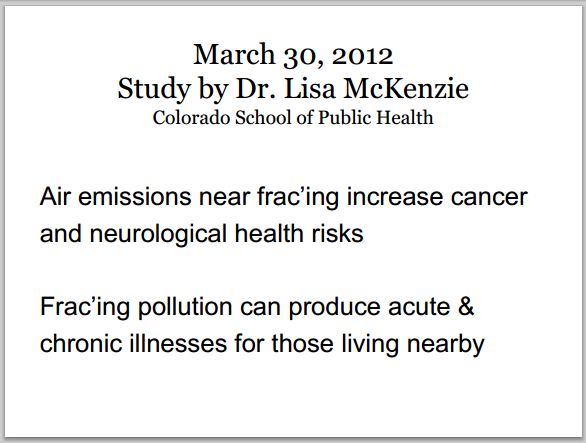
Slide from Ernst presentations
And taking Canadians backwards into frac hell:
Mr. Behn and the Council of Canadians need to live awhile with Daunheimers to experience “regulations” for what they are:

